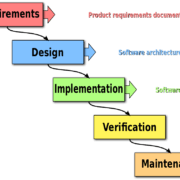What does Corporate App Development look like in 2024?
A corporate app in the business world today can serve as an alternative to a website to deliver a particular service within a business. No matter the size of the business, a mobile app is an avenue to deliver a consistent experience across multiple devices. Corporate app development is best described as the process of designing, building, and delivering bespoke applications for businesses.
To understand this, it would be useful to broadly classify corporate apps into two categories. First, internal apps are meant to help employees be more efficient at their day-to-day tasks within the company. A field service company, for instance, could have an app where staff can upload documents, monitor their schedule and access other important information while out in the field. Internal apps would also include human resource management apps where employees can book their leave days or update personal information.
The other category would include customer facing apps, which are meant to improve interactions between and its customers. These apps are mainly meant to drive revenue mainly by increasing the time in contact with customers as well as the quality of service to them.
Considerations Before Investing in a Corporate App
While the two broad categories of corporate apps are quite easy to differentiate, the decision on whether to put money into an app is anything but. From the start, the business has to be very clear about the purpose of the app. This determines what the minimum viable product will encompass in terms of features. App users are savvy and will not use an app whose value is not quantifiable from the onset.
Clear goals include conducting staff training, ensuring regulatory compliance, or making administrative work faster and easier. A corporate app should not set out to do too much to begin with. Other functionalities can always be added once there is a critical mass of users.
The app promoters (those championing the app) must carry out sufficient research before the building phase begins. The user pain-points have to be well documented, from actual data collection as opposed to assumptions. Then, the question of why a bespoke app is better than off-the-shelf solution must be raised. Remember, an enterprise app requires a maintenance budget and should work reliably across different operating systems and devices. Find out what other organizations in the industry are doing to handle similar operational problems.
To estimate the return on investment, a business should prepare a framework to quantity the gains made from building the app. This can be difficult for internal apps where there are no clear cash savings made. Other metrics such as time spent on the app, number of daily users, and user ratings and comments may be helpful. All these should be taken into account at the app design stage.
On engagement, there should be a well-planned app popularization strategy for quick adoption once the app is ready. For internal apps, there could be people requested to be evangelists for adoption of the app and a launch event to create the necessary buzz.
The Benefits of a Corporate Application
Greater Optimization Processes
A sustainable organization is a summation of all tasks that enable it to provide value to target customers while it remains a going concern. Often, inefficiencies in carrying out of tasks affects means the organization is ‘leaking value’ that could otherwise be delivered to customers or retained as profit.
By building an enterprise application, the goal is always to reduce such inefficiencies. Building modern applications to replace legacy systems can create efficiencies that can translate into value for an organization.
Better Planning and Reporting
For organizations that are keen on data-led decision making, an app can help to streamline the data handling process. Managers can receive the data they need to make real-time decisions. There are often important aspects of the business that remain obscured due to data unavailability. If the decision-makers of a business can get a monitoring dashboard or scheduled reports, a business can gradually work towards important KPIs which is eventually reflected on the bottom-line.
Automation through Corporate App Development
Businesses today have no choice but to adopt automation solutions where possible where possible. Building a corporate application in most cases is part of the automation agenda part of the business. For instance, an app created as an admin solution can have inbuilt workflows for approvals, task alerts, and reminders. Automation allows people within the business to focus on important and non-repetitive tasks.
Employee Engagement
There are corporate apps that are geared more towards promoting employee engagement. This often happens for large organizations with people spread out across many regions, states, or countries. By creating a social app, businesses hope to create an avenue to propagate culture, foster goodwill among colleagues, while encouraging people to be imaginative. The app can also serve as a source of truth for important company information, news, and new opportunities. Availing important information there can encourage employees to engage regularly with the app.
Productivity
Availing an app that reduces paperwork and repetitive tasks for employees has a positive impact on morale. Forward looking organizations send a message to the employees that the organizations are willing to invest in their success. Higher productivity is likely to be visible in higher customer satisfaction ratings and better quality of work.
In organizations that have some employees working remotely, an app can serve as an avenue for communication, work delivery, task assignment, and project management. Such a platform ensures that teams work in concert and that the quality of work does not suffer at all.
Scalability and Integration
A great advantage of corporate app development is that a solution is built with the integration needs of the app in mind. Most businesses use a combination of suites to make up their workflow. A corporate app solution is likely to have a flexible structure that allows them to work as stand-alone solutions or integrate with other software. All this is tailor-made for the specific case at hand.
Scalability is an equally important factor to consider when building corporate apps. The app should be able to handle increases in the number of users as a business grows. Scaling is important to avoid having to rebuild the app as demands grow. A scalable app should allow new features and functionalities to be built, only requiring updates to fix bugs and improve the UI.
Steps in Corporate App Development
Requirements Gathering
As earlier pointed out, there has to be a sufficient amount of information gathered on what an app should be. There has to be a clear link between the user needs, business goals, and the functionality of the app. This ensures that resources go into building the most important functionalities as opposed to building a bloated app with minimal functionality.
By conducting interviews with stakeholders, the development team ought to create a project scope with succinct features and specifications.
Planning Phase
Once the project deliverables are clear, focus can now shift to project planning. Some projects have shorter deadlines while development teams differ in the amount of resources at their disposal. It is at this stage that an approach for the project emerges. The team declares project timelines and milestones. It is prudent to establish communication channels for effective reporting of project progress, as well as accountability. It is common for projects to exceed their initial scope or deadlines to require adjusting. Maintaining open and frequent communication helps to avoid misunderstanding and project cost overruns too.
Wireframe Prototyping
The next step in the development process is to create an outline of the app on wireframing tools. It shows how the UI of the app will look like, including where images and buttons will be. Wireframes help to visualize the user journey, so that any adjustments necessary are done before coding begins. The goal is to achieve the smoothest user experience possible.
Development (Coding)
Once wireframes are approved, the corporate app development work can move to the actual coding of the application. A majority of the time goes into building both the backend functionality and the frontend (UI). The choice of technology to use rests largely on the development team but it is important to adhere to current best practices.
App security, in particular, is an area of concern. With numerous legislations coming up in various jurisdictions, the development team must be vigilant so that the app does not contravene any laws. The cloud solutions used, the app permissions, and the nature of data collected from users must all be in keeping with current legislation.
Testing
A corporate app requires rigorous testing before it is ready for the market. Fortunately, most of the testing today is automated and can be carried out as the code is being written. The main areas of testing are around security, functionality, and reliability of the app in different situations. The app architecture must be robust enough to withstand increases and reductions in user demand.
A sample of users may test the app before launch to give feedback on the UI/UX.
Deploying
Once the app is ready for the market, there should be a rollout plan to create enthusiasm around it. For a corporate app, creating communication material such as blog posts should help make intended users aware of the upcoming launch of the app. It would also be useful to create a space for users to discuss their experience once they start using it.
Management should keep track of indicators of user behaviour. These metrics include the number of downloads, sign ups, session lengths, most frequented pages and more. Such data will help determine the improvements necessary and the roadmap the app is likely to take.
Best practices require setting aside a budget equivalent to around 10% of development costs as an annual app maintenance budget. This should ensure efficient handling of bugs and feature requests from users. Unresponsiveness to complaints can quickly lead to loss of popularity of an app. This could be regardless of the resources the team spent in the initial development phase.
There is a general consensus now that a corporate app development initiative is not necessarily a project with definite start and end dates. Instead, it is a product that is continually growing and evolving. There must be ownership within the organization.
Corporate app development faces a few challenges.
Resources
The first major challenge a lot of corporations face in their app development initiatives is failure to commit sufficient resources. This could stem from improper research and project specifications leading to incomplete projects. The lack of a maintenance budget could also lead a project to fail soon after launching.
Security and Compliance
Customer-facing business apps require a framework to keep up with legislations on data handling. Businesses need to be careful about how they handle personal data, their own intellectual property and that of any suppliers they are working with. A small breach could result in irreparable damage both in terms of reputation and financially.
User promotion and Change Management
An app that replaces old ways of handling operations within the company may face resistance. Therefore, there should be efforts to reduce the steepness of the learning curve for new users. Users are more likely to embrace an app if there are resources to explain functionality and the app’s UI is intuitive.
Scaling and Heavy Workloads
Some apps face an inability to handle huge workloads. The wrong choice of technology and a weak architecture can cause under resourced apps to fail. Slow speeds, security breaches and frequent downtimes are common problems with unscalable applications. Proper planning and future-proof designing are the only way to prevent such eventualities from happening.
Corporate App Development at NS804
The choice of the development team when building a corporate app is absolutely crucial. Their approach to the project, their experience, level of professionalism are determinants of the success of your mobile application. If your business is planning to build an app to support any function, reach out to NS804. We are a world-class corporate app development firm with decades of combined experience in our team. We have a relentless resolve to keep up with current best practices in app development. No matter the size or function of your intended business app, our team will exceed any expectations.

 https://www.pexels.com/photo/black-and-silver-laptop-computer-on-round-brown-wooden-table-1181243/
https://www.pexels.com/photo/black-and-silver-laptop-computer-on-round-brown-wooden-table-1181243/










Leave a Reply
Want to join the discussion?Feel free to contribute!